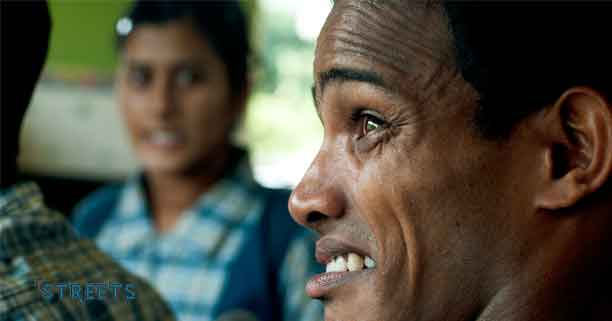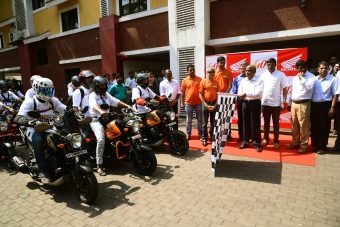Image from Daddy’s Home
“Oh, how could anybody think that sweet, precious baby could ever be a burden? Why, from the minute he was born, Albert was the joy of my life, the Lord’s greatest gift. I don’t believe there was a purer soul ever lived on this earth.”
– Ninny Threadgoode in the 1991 movie Fried Green Tomatoes, speaking of her mentally challenged son
No, they are not children of a lesser God (to use another movie reference). In fact, maybe there’s a special God just for them. Anybody who has loved a mentally challenged person knows these are special people with a lot to contribute, and these days many achieve a good degree of independence and even hold down jobs. Dr. Charlane Pereira e Rebello, a psychologist herself, caught up with a few experts and others in Goa who have worked closely with intellectually disabled children.
|
For the parents of intellectually disabled kids, it’s invariably a long and difficult journey. Take the case of Larita (not her real name). |
“Our son Simon (name also changed to protect privacy) didn’t start speaking at the normal age. He seemed different in many ways. We visited many doctors with the hope that he will be cured. But, he didn’t get any better. Till one day, a doctor explained his condition. We were devastated and visited many more doctors. It was difficult for us to accept what the doctor had said.”
“Though Simon is twenty-seven years now, he is like a small baby. He needs my help in most things. He asks silly questions at times. It’s tough to monitor him always.”
Larita’s husband passed away a few years back. Her brows furrow as she says, “I have two older children settled abroad. I often worry about what will happen to Simon when I am no more. I hope that one of his siblings will take care of him.”
Many parents and caregivers like Larita undergo a great deal of stress. A study in Goa conducted by Mita Majumdar et al (2005) found higher stress among such parents as compared to the general population. Also, stress was higher among those parents whose children had severe mental impairment as compared to those with mild or borderline impairment.
Rochelle Pereira, psychologist practicing in Margao, explains, “The degree of impairment can range from mild to profound. Lower Intelligence Quotient (IQ) scores indicate profound mental impairment.” Such intellectual impairments may cover reasoning, learning, problem solving, and in adaptive behavior. Social and practical skills are limited.
Special children need family assistance and community support to learn important life skills. It is often debated whether such children should be integrated into the mainstream education system and coached with the others.
Though the concept of inclusive education is slowly catching up here in Goa, we have special schools such as Daddy’s Home (Gogol, Margao), Atmavishwas School (Verna), Gujarat Samaj Charitable Trust (Margao), Sanjay Centre for Special Education (Porvorim), and a few others that cater to the mentally disabled.
Fr. Fr. Valmiki Gonsalves Dias, director of Daddy’s Home, says “The main aim is to make them independent. We teach these children to cook, impart vocational training, have art and craft, music, dance classes, etc. We have a good team to help our 105 students.”
Adds Fr. Valmiki, “Each child is psychologically assessed after which he/she is admitted in the class. We have classes for slow learners, vocational classes and for the younger ones who are beginning to read. They are placed as per their mental age (mental ability), not as per their chronological age (actual age).”
To be sure, Goa has its share of mentally disabled people. The 2011 Census of India recorded 15,05,624 individuals with mental disability, with 5272 from Goa – that is .35% of the total populace.
Working to integrate such mentally challenged children into the main society, we need to eradicate misconceptions about what they can and cannot achieve. Says Father Valmiki, “The more love you give them, the more you get from them.”
Nisha Gonsalves e Fernandes, a counselor with Fr. Agnel Ashram, Verna says, “I realized that these children are very loving though they may seem different from us. Working with them has increased my patience and understanding.”
The terms we use to describe mental disability – and the frequency by which they are changed – go to the heart of the subject’s sensitive history and society’s disparagement of the mentally challenged. Historically, whatever term is chosen to describe the condition eventually becomes an insult. So even a term like mental retardation, used since the mid 20th century, is now often viewed as offensive. The term ‘mental retardation’ itself was invented to replace previous terms that had come to be viewed as disparaging. The linguistic process is known as the ‘euphemism treadmill’.
Here in Goa, one of the biggest problems is that help never reaches those who need it – a problem compounded by both poor awareness and lack of resources. A survey conducted in 2007 showed that only 44.2% of Goans with disabilities had access to rehabilitative care facilities and only 24.2% availed of them. Around 22% were unaware of any rehabilitative facilities. (The survey covered all disabilities, not just mental).
Purva Kamat, behavioral therapist at Sethu says, “Having worked with these kids, I have come across parents from the rural areas who feel frustrated as there are no rehabilitative facilities in their vicinity. They have to commute for hours to avail the various therapies that will benefit their children.”
Several laws such as ‘The Persons with Disabilities (Equal Opportunities, Protection of Rights and full Participation) Act, 1995’ and ‘The National Trust Act, 1999’ aim at integrating the mentally challenged into society.
The Government of Goa funds special homes for such children in addition to several support facilities for the mentally challenged: free transport in Kadamba buses and ferries; books, uniforms, stationery to the disabled studying in special schools; Dayanand Social Security Scheme; assistance to disabled to purchase aids/appliances, etc.
However, to take advantage of many of these scheme, the disability should be 40% or more and has to be certified by a recognized medical authority. Purva avers, “Parents don’t take advantage of these Government schemes due to cumbersome and time-consuming procedures.”
It’s not that these kids don’t have potential. It’s just that they need help to reach it.



